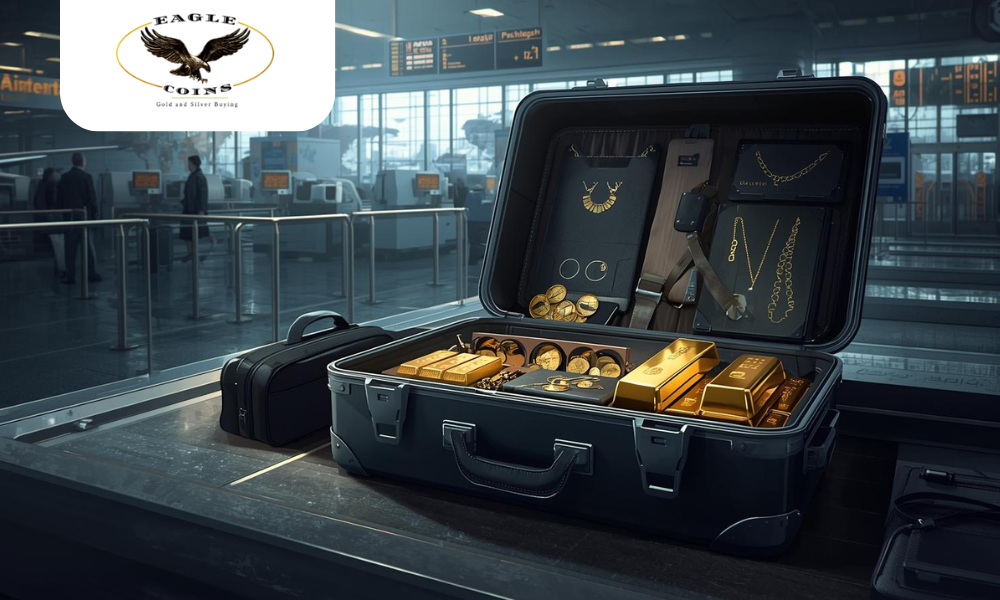Gold has been traditionally recognised as an investment that is safe and a store of wealth. You must understand the rules of gold on board when flying, whether you are a frequent flyer or planning to move your assets across borders. The question that many investors ask is, ‘How much gold can I carry in international flight?’
Understanding Gold Travel Regulations
The importation and exportation of gold are subject to varying regulations in different countries. These are laws that are aimed at preventing smuggling, money laundering, and tax evasion. While in some countries the gold can be imported duty-free, in others, it is obligatory to declare, and such a declaration requires payment of customs duties.
Travellers using air transport should be aware of the legal restrictions on the amount of gold they can carry on board to avoid fines, confiscation, or legal difficulties. Knowledge of these regulations ensures smooth transit and protects your precious assets.
How Much Gold Can I Carry in an International Flight?
The amount of gold that you can bring on an international flight will depend on the home country and the destination country. Travellers are usually permitted to carry some quantity of gold at no customs duty, provided that the quantity of gold is within the duty-free limits.
For example, in the USA, travellers entering the country are supposed to declare any gold or monetary instrument valued over $10,000. However, there is no specific limit; carrying any amount that exceeds this value must be reported, and if you fail to do so, it can result in fines or confiscation.
Other Countries: In many countries, there are certain limits, often ranging from 50 grams to 1 kg of gold. There are countries where travellers have to report any amount of gold, irrespective of the weight.
Due to the varied nature of regulation, it is necessary to study the regulations of the country, both on your arrival and departure.
Types of Gold You Can Travel With
Travellers can also carry gold in different forms, which include:
- Jewellery: Most travellers usually carry gold in the form of necklaces, bracelets, rings, and earrings. Jewellery is a type of personal belonging, and generally has higher duty-free limits.
- Coins: Gold coins are accepted extensively, but they have to be declared when they are found to be beyond the weight limit.
- Bars: Bars of gold are more restricted due to their high value. The large bars need to be cleared by customs, and many countries impose severe restrictions and limitations on their importation.
Purchase receipts or certificates of authenticity should be carried about, particularly with bars and coins, to prove the origin and the value of the gold.
Duty-Free Limits and Customs Declarations
The limits of duty-free travel are very important to understand. The penalty for going beyond these limits usually requires paying customs duty, which can be costly.
- The amount of duty-free allowance varies depending on your destination.
- Gold more than the duty-free limit should be announced at the customs. The non-declaration may lead to seizure or penalties.
- Some countries permit the payment of duty to legally transport additional gold, which is a safer option compared to dodging laws.
With proper planning and honesty with the customs, it is possible to avoid getting into legal trouble and ensure a stress-free journey.
Safety Tips for Travelling with Gold
Gold is very valuable, and so it should be handled with care when travelling internationally. Here are some practical tips:
- Carry a Secure Carry-On: Store gold in your carry-on baggage instead of checked baggage to prevent theft.
- Divide Your Gold: When you are carrying large amounts, you should divide them into smaller parts to reduce the risk.
- Keep Documentation: Bring receipts, certificates of authenticity and purchase invoices to be checked at customs.
- Avoid Flashy Displays: Do not put on or wear too much jewellery at the airports to ensure that people do not give unnecessary attention to you.
- Consider Insurance: Insuring your gold can safeguard you against theft, damage to your gold or loss during transit.
These measures help in securing and complying with the transportation of gold across borders.
Why Work with Trusted Dealers
If you plan to buy gold in another country and carry it back home, it is easier to deal with reputable dealers. Reputable dealers offer certificates of authenticity, legal advice and regulations on customs paperwork. Eagle Coins Gold and Silver Buying can guide you to understand international travel rules and ensure that the gold investments are transported safely and legally.
Country-Specific Guidelines
Travellers should research regulations specific to their destination:
- United States: Gold that is worth more than $10,000 is to be reported and adhered to import regulations by travellers.
- European Union: Travellers can bring gold for personal use; however, a lot of gold should be declared and might be subject to duty.
- Middle East: There are several countries that permit lower gold importation duty-free, but which impose strict reporting requirements for higher amounts.
To avoid fines, it is important to ensure one agrees with the official customs websites before travelling.
Planning Ahead
Being aware of how much gold can I carry in international flight is only the first step. This is how to plan good travels:
- Check the baggage rules of airlines for valuables.
- Pack gold in a carry-on bag.
- Prepare customs documentation and receipts for verification
- Travel insurance is an option to be considered.
Through these measures, travellers can carry their gold across borders without any problems.
Conclusion
It is essential to be familiar with the relevant laws, weight restrictions, and proper documentation when transporting gold during an international flight. Many travellers often ask, How much gold can I carry in international flight, and the answer is different depending on the country and the type of gold. Jewellery usually has a higher duty-free limit, while coins and bars may be liable for registration and payment of duty.
By following legal guidelines and securing your gold with the help of reputable dealers such as Eagle Coins Gold and Silver Buying, you can carry your investments safely and with ease. With proper planning, knowledge of the customs laws and adequate handling, you can be sure that your gold is a secure and valuable asset even when you are travelling across borders.
FAQs
-
How much gold can I carry in an international flight?
The limit of how much gold you can carry depends on the customs rules of your destination country. For example, if you’re going to the USA, you must declare gold or any other valuables over $10,000, while other countries might have different rules.
-
What is the limit of duty-free gold?
The limit of duty-free gold is different for every country. In some countries, you can carry up to 50 grams to 1 kilogram of gold without any duty, and in some countries, your valuables have to be below a certain amount.
-
What happens if I don’t declare gold?
If you fail to declare the gold above the allowed limit, the customs officer of that country might impose fines, confiscate your gold, or impose legal action against you, depending on their laws.
-
How much gold needs to be declared?
If you’ve the gold that exceeds the customs rules, such as duty-free limit of your destination country, it must be declared. Make sure you research the duty-free rules of the country you’re travelling to avoid any problems.
-
Do I have to declare my personal jewelry at customs?
Personal jewellery, which is often used for everyday life, often does not require any declaration if it falls under the duty-free allowance, but excess or any investment pieces may need to be declared.
-
What is the limit of gold without tax?
In many countries, it is allowed for travellers to carry small amounts of jewellery or gold, such as 50 grams to 1 kilogram, tax-free, but this also depends widely on the region.
-
Do you get taxed if you buy gold?
Yes, if you buy gold, you might have to bear the taxes, such as sales tax, VAT, or capital gains tax when you sell the gold, which entirely depends on local laws.
-
Is gold a good investment?
Yes, gold is usually considered a safe investment that protects your wealth against inflation, fluctuations in currency, or any economic uncertainty.


